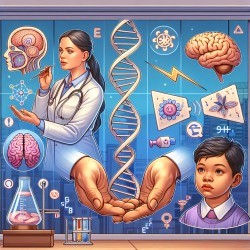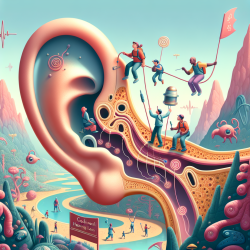Introduction
In the realm of speech-language pathology, particularly when working with children, the integration of cognitive training and understanding neuroplasticity can significantly enhance therapeutic outcomes. The recent study titled "Cognitive training and neuroplasticity in mild cognitive impairment (COG-IT): protocol for a two-site, blinded, randomised, controlled treatment trial" offers insights that can be adapted to improve therapeutic practices for children.
Understanding the Research
The COG-IT study focuses on the potential of computerised cognitive training (CCT) to improve cognitive functioning in older adults with mild cognitive impairment (MCI). The study employs a suite of cognitive exercises targeting memory, processing speed, and spatial recognition, among other skills, to harness the brain's neuroplasticity. While the primary focus is on older adults, the principles of cognitive training can be applied to children to foster cognitive development and address speech and language challenges.
Applying Cognitive Training in Pediatric Therapy
For practitioners in speech-language pathology, incorporating cognitive training into therapy sessions can be transformative. Here are some ways to apply the findings from the COG-IT study to improve outcomes for children:
- Customised Cognitive Exercises: Develop exercises that target specific cognitive skills such as memory, attention, and processing speed. These exercises can be integrated into therapy sessions to enhance language acquisition and comprehension.
- Engaging and Interactive Tools: Utilize interactive and engaging tools similar to those used in the COG-IT study. This approach can help maintain children's interest and motivation, leading to more effective therapy sessions.
- Long-term Engagement: Implement a structured plan for regular cognitive training sessions, similar to the booster sessions in the COG-IT study. Consistent practice can reinforce learning and support long-term cognitive development.
Encouraging Further Research
While the COG-IT study provides a robust framework for understanding the benefits of cognitive training, further research is needed to tailor these strategies specifically for children. Practitioners are encouraged to engage in research initiatives that explore the impact of cognitive training on speech and language development in children. Collaborating with researchers and participating in studies can provide valuable data to refine therapeutic approaches.
Conclusion
By integrating cognitive training and leveraging the brain's neuroplasticity, speech-language pathologists can enhance their therapeutic practices and create better outcomes for children. The principles outlined in the COG-IT study offer a promising avenue for innovation in therapy, encouraging practitioners to adopt data-driven strategies and continue exploring the potential of cognitive interventions.
To read the original research paper, please follow this link: Cognitive training and neuroplasticity in mild cognitive impairment (COG-IT): protocol for a two-site, blinded, randomised, controlled treatment trial.










